

Storage Technology Foundations (Information Storage and Management) Learning Path. Association for Data Center Management Professionals. Whether you’re a data center or facilities management professional or provide a product or service to the data center industry, an AFCOM membership will provide you with invaluable connections, convenient access to real-world, practical and thought leading educational resources and discounts on training, certifications and industry events. 6 Key Benefits of Joining AFCOM: Exclusive education and certification discounts worth thousands of dollars!
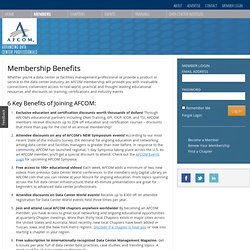
Through AFCOM’s educational partners including CNet Training, EPI, IDCP, ICOR, and TSI, AFCOM members receive discounts up to 20% off education and certification courses – discounts that more than pay for the cost of an annual membership! What is Data Center Infrastructure Management? Data Center Infrastructure Management (DCIM) means many things to many people.
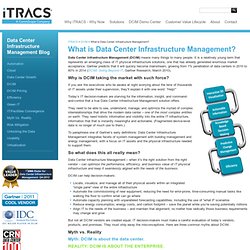
It is a relatively young term that represents an emerging class of IT physical infrastructure solutions, one that has already generated enormous market acceptance. Gartner predicts that it will quickly become mainstream, growing from 1% penetration of data centers in 2010 to 60% in 2014 (DCIM: Going Beyond IT, Gartner Research, March 2010). Why is DCIM taking the market with such force? If you ask the executives who lie awake at night worrying about the tens of thousands of IT assets under their supervision, they’ll explain it with one word: “Help!”
Today’s IT decision-makers are starving for the information, insight, and command-and-control that a true Data Center Infrastructure Management solution offers. They need to be able to see, understand, manage, and optimize the myriad of complex interrelationships that drive the modern data center – one of the most complex entities on earth. Myth vs. The bottom line. Data Center and Virtualization Overview. Data Center Knowledge: Industry News and Analysis About Datacentres. Cloud Computing Magazine. What Is Cloud Computing? "What's the cloud?
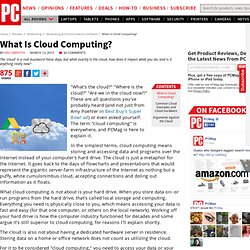
" "Where is the cloud? " "Are we in the cloud now?! " These are all questions you've probably heard (and not just from Amy Poehler in Best Buy's Super Bowl ad) or even asked yourself. The term "cloud computing" is everywhere, and PCMag is here to explain it. In the simplest terms, cloud computing means storing and accessing data and programs over the Internet instead of your computer's hard drive. What cloud computing is not about is your hard drive.
The cloud is also not about having a dedicated hardware server in residence. For it to be considered "cloud computing," you need to access your data or your programs over the Internet, or at the very least, have that data synchronized with other information over the Net. Consumer vs. How Cloud Computing Works - HowStuffWorks. Let's say you're an executive at a large corporation.
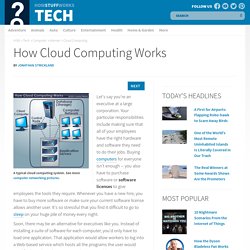
Your particular responsibilities include making sure that all of your employees have the right hardware and software they need to do their jobs. Buying computers for everyone isn't enough -- you also have to purchase software or software licenses to give employees the tools they require. Whenever you have a new hire, you have to buy more software or make sure your current software license allows another user. Tape Backup vs Hard Disk Backup: What Does the Future Hold? I was frequenting Spiceworks earlier today and came across a post asking if “tape was legacy”.
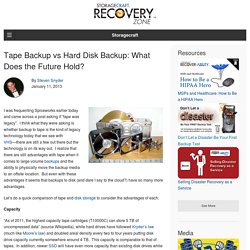
I think what they were asking is whether backup to tape is the kind of legacy technology today that we see with VHS—there are still a few out there but the technology is on its way out. I realize that there are still advantages with tape when it comes to large volume backups and the ability to physically move the backup media to an offsite location. Focused on Storage, Virtualization and Cloud. VMware vSphere: Storage Virtualization & Storage Management.
IBM DS8870 Architecture and Implementation. This IBM® Redbooks® publication describes the concepts, architecture, and implementation of the IBM DS8870.
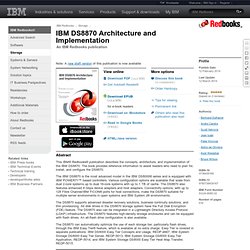
The book provides reference information to assist readers who need to plan for, install, and configure the DS8870. The IBM DS8870 is the most advanced model in the IBM DS8000® series and is equipped with IBM POWER7+™ based controllers. Various configuration options are available that scale from dual 2-core systems up to dual 16-core systems with up to 1 TB of cache. The DS8870 also features enhanced 8 Gbps device adapters and host adapters. Connectivity options, with up to 128 Fibre Channel/IBM FICON® ports for host connections, make the DS8870 suitable for multiple server environments in open systems and IBM System z® environments. The DS8870 supports advanced disaster recovery solutions, business continuity solutions, and thin provisioning. CentOS. Accepting Technology. Program: Information Systems and Operations Management - University of Florida - Acalog ACMS™
The Department of Information Systems & Operations Management offers graduate courses leading to the Master of Science in Information Systems and Operations Management (M.S.ISOM); the Ph.D. degree in Business Administration; and a concentration in the Master of Business Administration (M.B.A.) program.
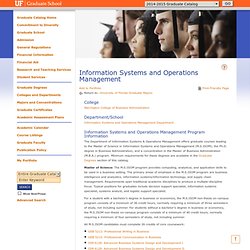
Minimum requirements for these degrees are available in the Graduate Degrees section of this catalog. Master of Science: The M.S.ISOM program provides computing, analytical, and application skills to be used in a business setting. The primary areas of emphasis in the M.S.ISOM program are business intelligence and analystics, information systems/information technology, and supply chain management.
Requirements span traditional academic disciplines to produce a multiple-discipline focus. Typical positions for graduates include decision support specialist, information systems specialist, systems analyst, and logistic support specialist. Choosing an Open Storage Operating System. It is becoming increasingly common to forgo traditional, proprietary storage devices, both NAS and SAN, and instead using off the shelf hardware and installing a storage operating system on it for, what many call, “do it yourself” storage servers.
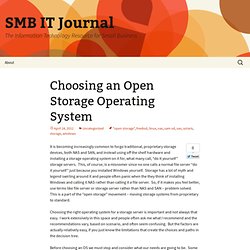
This, of course, is a misnomer since no one calls a normal file server “do it yourself” just because you installed Windows yourself. Storage has a lot of myth and legend swirling around it and people often panic when the they think of installing Windows and calling it NAS rather than calling it a file server. So, if it makes you feel better, use terms like file server or storage server rather than NAS and SAN – problem solved. This is a part of the “open storage” movement – moving storage systems from proprietary to standard.